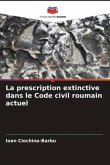The present paper aims to highlight the regulation of the legal institution of Extinctive Prescription from the perspective of legislative novelty in the matter brought by the new Civil Code in Romania, Law no.287 / 2009 and Law no. 71/2012 regarding its implementation compared to the old Romanian Civil Code regulation of 1864. Thus, for example, in the view of the new Civil Code, prescription is no longer an institution of public order, the new provisions qualifying it as a private order institution. This means that the competent jurisdiction body can not currently apply the ex officio [art. 2512 paragraph (2) Civil Code] the prescription can not be invoked even when it is in the interest of the state or of its administrative-territorial units [art.2512 par. (3) Civil Code]. Further details on this matter will be revealed by going through this work.
Bitte wählen Sie Ihr Anliegen aus.
Rechnungen
Retourenschein anfordern
Bestellstatus
Storno








